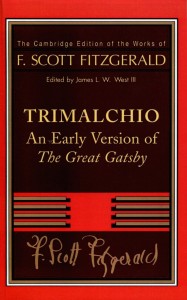 I’m reading. That’s about all I can say.
I’m reading. That’s about all I can say.
I have one week to read Trimalchio, one week to read The Great Gatsby, and about one week to watch four Gatsby movies.
I think I can handle that.

Hello F. Scott.
This leg of my three-year journey through the works of the world’s greatest composers, authors, filmmakers, musicians, and actors is a three-week assessment of F. Scott Fitzgerald’s great American novel The Great Gatsby.
According to its entry on Wikipedia:
The Great Gatsby is a 1925 novel written by American author F. Scott Fitzgerald that follows a cast of characters living in the fictional town of West Egg on prosperous Long Island in the summer of 1922. The story primarily concerns the young and mysterious millionaire Jay Gatsby and his quixotic passion and obsession for the beautiful debutante Daisy Buchanan. Considered to be Fitzgerald’s magnum opus, The Great Gatsby explores themes of decadence, idealism, resistance to change, social upheaval, and excess, creating a portrait of the Jazz Age or the Roaring Twenties that has been described as a cautionary tale regarding the American Dream.
Fitzgerald, inspired by the parties he had attended while visiting Long Island’s north shore, began planning the novel in 1923 desiring to produce, in his words, “something new—something extraordinary and beautiful and simple and intricately patterned.” Progress was slow with Fitzgerald completing his first draft following a move to the French Riviera in 1924. His editor, Maxwell Perkins, felt the book was too vague and convinced the author to revise over the next winter. Fitzgerald was ambivalent about the book’s title, at various times wishing to re-title the novel Trimalchio in West Egg.
And that’s where my journey begins – with Trimalchio: An Early Version of The Great Gatsby.
Over the course of the next 24 days, I’ll read Trimalchio, The Great Gatsby, Fitzgerald’s novel that became the basis for a bunch of film versions…and then watch all four said movies (a 1925 silent adaptation is a lost film):
1949 – starring Alan Ladd, Betty Field and Shelley Winters
1974 – starring Robert Redford, Mia Farrow and Sam Waterston
2000 – starring Paul Rudd, Mira Sorvino and Toby Stephens
2013 – starring Leonardo DiCaprio, Carey Mulligan and Tobey Maguire
And then compare and contrast them (as my college professors asked me to do on exams).
I’m not sure how I’ll keep the blog, though.
It’s one thing to listen to a CD every day and write about it. It’s another thing to read a book and…what? Do I write how many pages I read? What I’m thinking as I read it?
I’ll figure it out.
I’m a big boy.
 I would have preferred to end my eye-opening journey through complete works of Ludwig van Beethoven with symphonic music, like a piano trio or a symphony or even a violin concerto.
I would have preferred to end my eye-opening journey through complete works of Ludwig van Beethoven with symphonic music, like a piano trio or a symphony or even a violin concerto.
As it is, finishing today – 86 days after I started listening to Beethoven – with these folk songs kind of leaves a bad taste in my mouth.
That’s not to say I haven’t enjoyed this musical exploration. Or that I intensely dislike what I’m hearing this morning.
On the contrary, Beethoven was as big a thrill to me as when I listened to Mozart for 180 days (his complete works on 180 CDs) a few years ago.
Maybe more so.
Definitely more so.
Beethoven took me by surprise. Totally.
I had no idea Beethoven was this rich, complex, emotional, melodic, and profound. The word deep comes to mind most often when I consider Beethoven’s music. Yet, that’s not even the word I’m looking for. It’s a combination of deep, rich, emotional, melodic, et al. All together.
By way of contrast, when I listened to the complete works of Haydn, I got little out of it other than 150 days of effort. I don’t remember a single melody, most likely because I never heard one that stuck with me. Frankly, Haydn bored me.
Mozart was a blast to study. I learned a great deal – but Continue reading
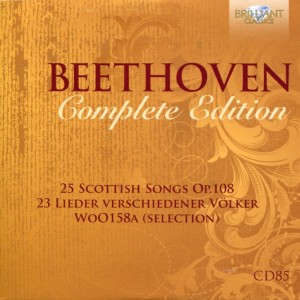 Essentially, today’s CD is more of the same as yesterday’s CD.
Essentially, today’s CD is more of the same as yesterday’s CD.
About twice more.
More “Margaret Dumont” – like female singers.
More bouncy songs that sound like a cross between church hymns sung by middle-aged ladies, and songs performed by upper-crust Englishmen/women, than folks songs.
It’s not my favorite genre of music.
Although, this song (Track Three – “O Sweet Were The Hours”) isn’t bad:
But here. Now, here’s an example of what grates on me:
It’s called “The Sweetest Lad Was Jamie.”
Here’s an example of a song that I just think is funny. It’s called “O Thou Art the Lad of My Heart, Willy.” (Why are so many people in Scottish and Irish folk songs named “Willy”?)
There are 41 tracks on today’s CD, the last one being a really smart instrumental called “Air Francais.”
I prefer instrumental music to vocal music.
 I know what Scottish songs are. But I have no idea what Verschiedene Volkslieder are. I’m guessing it’s German, and something to do with songs of the people (“volks”).
I know what Scottish songs are. But I have no idea what Verschiedene Volkslieder are. I’m guessing it’s German, and something to do with songs of the people (“volks”).
So I Googled it. The word Volkslieder means “folks songs.”
The phrase Verschiedene Volkslieder means something like Songs from Different Nations.
Therefore, the second 12 songs on today’s CD are an assortment of folk songs from various countries.
The first half (“12 Scottish Songs”) is okay. But they seem like church hymns. Or what a group of upper-class people would sing. Not folk songs in the traditional sense. Here. Listen to a few examples:
This one is the opening track, a song called “The Banner of Buccleuch”:
This one is Track Five (“Cease Your Funning”):
The songs are okay. But nothing I’d listen to again.
The second half of the CD starts with “God Save the King,” a song well known to most of Western culture.
Unfortunately, that vocal range – especially the female singer – is like nails on a chalkboard to me.
Again, that is not to suggest any lack of talent on the part of the singer. No way. She is enormously talented. But that style of singing reminds me of Margaret Dumont, Groucho Marx’s sidekick in all of Marx Brothers movies.
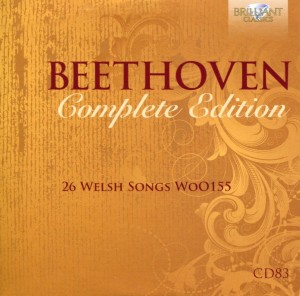 Welsh songs, also sung in English, are more of a romp.
Welsh songs, also sung in English, are more of a romp.
Today’s CD opens with a song (“Sion, the Son of Evan”) that sounds like horses bursting from the chute. It’s a lively song from start to finish.
Even the song “The Monks of Bangor’s March” (Track 2) has a determination to it. Monks are usually considered peaceful and wandering. But this sounds like a drinking song, which – I suppose – is not out of the question. Monks can drink, too, eh?
Welsh songs do not resonate with me the way Irish songs do. I can dig that they’re sung in English and that they’re lively. But their subject matter (at least, in this collection) seems almost like the stuff of fantasy – Fair Maiden, Aeolian Harp, Golden Robe, Damsels of Cardigan, the Vale of Clwyd, etc.
Irish songs, on the other hand, seem to be about love and loss and drinking and battles, etc.
I realize I’m over-generalizing. I’m sure there are some rollicking good Welsh songs that take me back to the moors and castles and swords and wenches with pints of ale.
And it’s not that these songs aren’t robust. They are. They’re hearty and raucous in their own way.
They just don’t tug at the heartstrings and make me get all misty-eyed like songs from Ireland do.
NOTE: Today’s CD is 83 out of 86. That means in just three days – by Thursday, July 10th – I’ll start the next leg of my journey: The Great Gatsby in print and movies. Both Gatsby novels, and four Gatsby movies, all within 21 days.
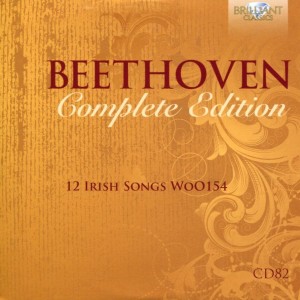 How can you go wrong with a CD that opens with a song about Elfin Fairies?
How can you go wrong with a CD that opens with a song about Elfin Fairies?
You can’t.
I swear, you just can’t.
Once again, we have Irish songs sung in English, performed by some of the best musicians in the world:
Barbara Emilia Schedel soprano
Kerstin Wagner alto
Daniel Schreiber tenor
Daniel Raschinsky baritone
Sachiko Kobayashi violin
Chihiro Saito cello
Michael Wagner piano
Although today’s CD features the incomparable Daniel Schreiber (tenor), I have to take a few points off for the alto. That’s a vocal range I never do warm up to.
So, whereas yesterday’s CD was a Favorite from start to finish, today’s CD is only good occasionally. For example, everything Daniel Schreiber sings (in whole or in part) is pure gold:
The Farewell Song (Track 3)
Put round the bright wine (Track 6)
Save me from the grave and wise (Track 8)
Oh! would I were but that sweet linnet! (Track 9)
The hero may perish (Track 10)
The Soldier in a Foreign Land (Track 11)
He promised me at parting (Track 12)
I swear, Daniel Schreiber has the voice of an angel.
The above features perhaps half of the songs to which I listened this morning.
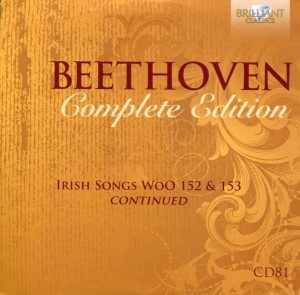 I must have Celtic blood in my genes.
I must have Celtic blood in my genes.
I’ve always enjoyed songs from Ireland.
And I usually enjoy songs sung in English.
I’m in luck. Today’s CD features both, performed by:
Dorothee WWohlgemuth soprano
Christine Wehler alto
Georg Poplutz tenor
Jens Hamann baritone
Martin Haunhorst violin
Bernhard Schwarz cello
Rainer Maria Klaas piano
These are terrific songs, filled with typical Irish lilt and pathos.
A good example of the former is Track 6 (“No. 12 English Bulls”). A good example of the latter is Track 14 (“No. 6 Sad and luckless was the season”).
Here. See for yourself. Here’s some of what I heard today:
This is a CD I could listen to again. It’s just a delightful assortment of Irish songs composed by a Classical master and performed by world-class musicians. How can you not like that?
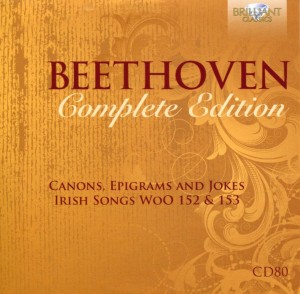 What a strange collection of songs!
What a strange collection of songs!
Today’s CD features 72 tracks, only a couple of which are over two minutes in length. Most are mere snippets, roughly 20-40 seconds in length, that sound like people are just goofing around.
It’s hard to describe what I’m hearing. The music fits the title of the CD well, especially the idea that these are “musical jokes,” which is a phrase I’ve run into from time to time listening to the great Classical composers. Apparently, it was fun for composers to create little bits of music – sometimes within more serious compositions – that other eggheads would recognize as a “joke,” something that was deliberately placed into the music for little reason other than to make people laugh.
A list of some of Beethoven’s musical humor can be found here.
This CD isn’t really one I could listen to again – unless I was listening for the purpose of hearing all of these light-hearted pieces of music and studying the history of them.
That’s not to say these pieces aren’t well-written. They are. Also, it’s obvious to me that they’re well performed. They are.
But 72 tracks of music that are mere snippets, and often sound like two (or more) singers are competing to find the right key, isn’t my cup of tea.
Still, it was worth a listen.
Here. Give a listen yourself:
This is the same music to which I listened today. From 9:11 to 9:50 especially fascinates me.
Here’s another example:
The opening track is called “Brauchle, Linke Wo0167.”
There. Now you’ve heard some of Beethoven’s lighter music, too.
Who says Ludwig was just a scowly old curmudgeon?
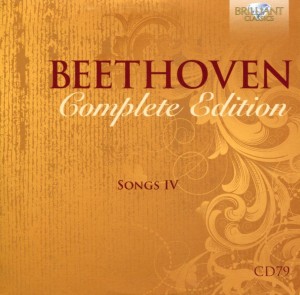 The incomparable Peter Schreier is back on Songs IV.
The incomparable Peter Schreier is back on Songs IV.
And he sounds wonderful, easily one of the best tenors I’ve ever heard in my life.
Even when he’s singing a slow, emotional song (“Auf dem Hugel sitz ich, spahend” – the first movement of An Die Ferne Geliebte Op. 98) – in German (which to me sounds absolutely hilarious), he’s still amazing.
But, boy, what a voice he has.
He could probably sing the white pages of a phone book (do they still make those?) and it would sound compelling.
And, by the way, “An die ferne Geliebte” means “To the distant beloved.” So, I was right. It is an emotional song. The song has its own Wiki entry:
An die ferne Geliebte (To the distant beloved), Op. 98, is a composition by Ludwig van Beethoven written in April 1816. It is considered to be the first example of a song cycle by a major composer.
Beethoven’s only song cycle was the precursor of a series of followers, including those of Franz Schubert, Robert Schumann and Carl Loewe. The setting is for a man’s voice (usually tenor) with piano. The title page of the original edition (S. A. Steiner, Vienna) bore a dedication with permission to Fürst Joseph von Lobkowitz, Duke of Raudnitz, a leading Austrian musical patron, in whose palace the Eroica Symphony was first performed in 1804; Beethoven also dedicated the six string quartets, Op. 18, the Eroica Symphony, Op. 55, the Triple Concerto, Op. 56, the C minor Symphony, Op. 67, the Pastoral Symphony, Op. 68, and the String Quartet, Op. 74 to him.
The text was written by a physician named Alois Isidor Jeitteles, probably at Beethoven’s request. Then aged 22, Jeitteles published several short poems, economic in style, in Viennese magazines or almanacks, particularly ‘Selam’ and ‘Aglaja’, and was making his name by it. He was an active, selfless young man who later distinguished himself by working tirelessly for his patients during a dreadful cholera epidemic and mortality in Brno. Beethoven had already explored inward feelings of longing in his setting of Matthisson’s Adelaïde, but in these poems the distance from the beloved is greater, the longing is more intense and stormier, and is no longer satisfied with merely the sound of her name, but is preoccupied with the clawing pain of separation which colours the whole surrounding landscape.
Somewhere along the way, I must have Googled Peter Schreier. But I think it’s time Continue reading